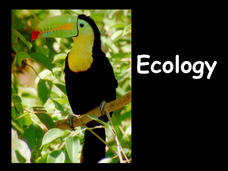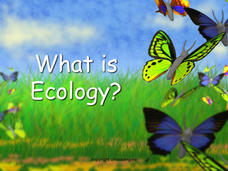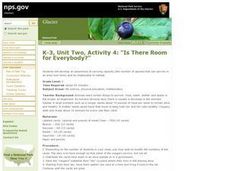Curated OER
Cycling of Matter and Energy
These twenty various types of questions related to the cycling of matter and energy require students to match each definition in column 1 with the correct vocabulary term from column 2. Then, students explain what is being demonstrated...
Curated OER
What Do Koalas Need to Survive?
First graders take a field trip and examine the Koala and his habitat. In this Koala lesson, 1st graders read Possum Magic and discuss the foods of Australia. Students view the habitat of a Koala and record what it eats, its...
K12 Reader
Competing for Resources
Young biologists examine the concept of scarce resources with a reading comprehension passage. After finishing the paragraphs, learners turn to the questions to demonstrate what they have learned about what is beneficial and what is...
National Wildlife Federation
Massive Migrations
Turn your students into flocks of migratory birds for this fun lesson on animal migration. Prior to the activity, the teacher creates four different migration routes in the classroom or any available open space, labeling nesting...
Michigan State University
Preferred Destinations
Pests vacation, too! Here, scholars create travel brochures or posters that inform others about a habitat in which a pest lives. Travel information to be included contains everything from pictures to resort names to slogans...
Biology Junction
Ecology
Psychologists study human relationships while ecologist study relationships between organisms in the environment. An introduction to ecology and the related vocabulary benefits scholars as they progress through the presentation and...
Biology Junction
What Is Ecology?
Do you know the name for the biological study of interactions? A short presentation with accompanying worksheet introduces individuals to ecology. The materials offer a broad overview of the subject and the levels of organization to...
Curated OER
Is There Room for Everybody?
Third graders examine the capacity of animals able to live in one habitat. In this habitat lesson plan, 3rd graders play a game that shows the food chain and the interactions between animals in an area. Students discover that food is a...
NOAA
Importance of Deep-Sea Ecosystems – How Diverse is That?
When judging diversity of an ecosystem, both species evenness and species richness must contribute. After a discussion of diversity and a guided example using the Shannon-Weaver function, scholars use the same function on two other...
NOAA
Build Your Own Ocean Ecosystem
Hold the sea in the palm of your hand! Amateur oceanographers work together to create models of an ocean ecosystem in the sixth and final installment in a series. Raise awareness of global ocean health issues through guided research,...
NOAA
A Quest for Anomalies
Sometimes scientists learn more from unexpected findings than from routine analysis! Junior oceanographers dive deep to explore hydrothermal vent communities in the fourth lesson in a series of five. Scholars examine data and look for...
Curated OER
Fish Banners
An art lesson involving fish can accent a wide variety of subjects. Here are the steps needed to create a fish banner with paint, shapes, cardboard, and paper. This would be a nice way to start or finish a unit on fish or underwater...
Curated OER
The Great Pond Safari
Students study pond life by visiting a pond and completing an associated worksheet. They play an online game based on the pond learning experience.
Curated OER
A Home for a Cricket
First graders build a habitat for crickets after studying animal survival needs. They care for and observe the crickets in the classroom habitat.
Curated OER
Adaptation and Diversity on Sheffield Island
Written for an exploration of shoreline ecosystems on Sheffield Island, this gives ecology or marine biology buffs a hands-on experience. Using GPS or visual triangulation techniques, they lay transect lines on a high and a low energy...
NOAA
Stressed Out!
Are our oceans really suffering due to the choices humans make? The sixth and final installment in the volume of activities challenges research groups to tackle one of six major topics that impact ocean health. After getting to the...
Curated OER
Our Schoolsyard is Full of Biology
Students study the habitats found in their schoolyard. They apply firsthand, what they have learned in the classroom to something familiar to them. Students look at biotic, abiotic habitats. Small groups will present their findings to...
Curated OER
The Magic School Bus Gets Swamped
Students participate in an experiment that shows them how wetlands filter dirty water. They work in groups to accomplish this experiement with the help of supervisors. A bulletin board can be created to show the plants and animals that...
Curated OER
Habitat Lap Sit
Fourth graders physically form a circle that shows the interconnectedness of the components of a habitat. They form circles and role play the parts of habitats.
Curated OER
Wolf Habitat
Students identify their own basic needs for food, water, shelter and space in a suitable arrangement. They generalize that wolves and people have similar basic needs.
Curated OER
Head to Foot
Students describe the body form and major anatomical structures of squids and describe some unusual or unique features of newly-discovered deep water squid species. They infer what types of food squids use from their anatomical features.
Curated OER
Endangered Spaces = Endangered Species!
Sixth graders discuss the crowding, loss of personal space, loss of home, loss of food, etc. that might occur at a developmental site. They witness, through an in-class demonstration, what happens when land is taken for development. They...
Curated OER
What Lives in Oceans and Wetlands?
In this habitats worksheet, students compare and contrast what lives in an ocean habitat and a wetland habitat. This worksheet is a graphic organizer.
Curated OER
Helping Plants Grow Well
Students explain the effect of water, temperature and light on plant growth.
Other popular searches
- Animals Water Habitats
- Animal Water Habitats
- Land or Water Habitats
- Shallow Water Habitats
- Water Habitats Lesson Plans
- Describe Water Habitats
- Water Habitats Rivers

























